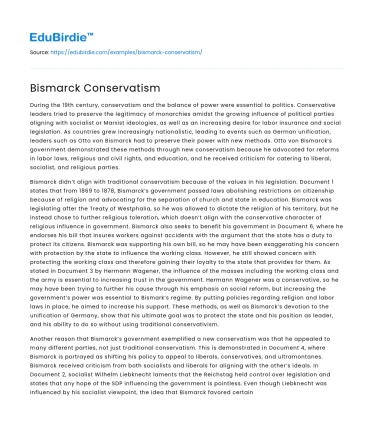During the 19th century, conservatism and the balance of power were essential to politics. Conservative leaders tried to preserve the legitimacy of monarchies amidst the growing influence of political parties aligning with socialist or Marxist ideologies, as well as an increasing desire for labor insurance and social legislation. As countries grew increasingly nationalistic, leading to events such as German unification, leaders such as Otto von Bismarck had to preserve their power with new methods. Otto von Bismarck’s government demonstrated these methods through new conservatism because he advocated for reforms in labor laws, religious and civil rights, and education, and he received criticism for catering to liberal, socialist, and religious parties.
Bismarck didn’t align with traditional conservatism because of the values in his legislation. Document 1 states that from 1869 to 1878, Bismarck’s government passed laws abolishing restrictions on citizenship because of religion and advocating for the separation of church and state in education. Bismarck was legislating after the Treaty of Westphalia, so he was allowed to dictate the religion of his territory, but he instead chose to further religious toleration, which doesn’t align with the conservative character of religious influence in government. Bismarck also seeks to benefit his government in Document 6, where he endorses his bill that insures workers against accidents with the argument that the state has a duty to protect its citizens. Bismarck was supporting his own bill, so he may have been exaggerating his concern with protection by the state to influence the working class. However, he still showed concern with protecting the working class and therefore gaining their loyalty to the state that provides for them. As stated in Document 3 by Hermann Wagener, the influence of the masses including the working class and the army is essential to increasing trust in the government. Hermann Wagener was a conservative, so he may have been trying to further his cause through his emphasis on social reform, but increasing the government’s power was essential to Bismark’s regime. By putting policies regarding religion and labor laws in place, he aimed to increase his support. These methods, as well as Bismarck’s devotion to the unification of Germany, show that his ultimate goal was to protect the state and his position as leader, and his ability to do so without using traditional conservativism.
Save your time!
We can take care of your essay
- Proper editing and formatting
- Free revision, title page, and bibliography
- Flexible prices and money-back guarantee
Another reason that Bismarck’s government exemplified a new conservatism was that he appealed to many different parties, not just traditional conservatism. This is demonstrated in Document 4, where Bismarck is portrayed as shifting his policy to appeal to liberals, conservatives, and ultramontanes. Bismarck received criticism from both socialists and liberals for aligning with the other’s ideals. In Document 2, socialist Wilhelm Liebknecht laments that the Reichstag held control over legislation and states that any hope of the SDP influencing the government is pointless. Even though Liebknecht was influenced by his socialist viewpoint, the idea that Bismarck favored certain political parties was also true for liberals. Eugen Richter, a liberal journalist, stated in Document 7 that Bismarck’s system of government allowed for the domination of the socialist party and conflict between political ideas. Richter was biased against Bismarck because he was liberal, but the fact that both the socialist and liberal parties in Germany believed that Bismarck favored certain parties shows that his style of government was a new form of conservatism that secured power for the state by not aligning completely with conservative, liberal, or socialist values.






 Stuck on your essay?
Stuck on your essay?

